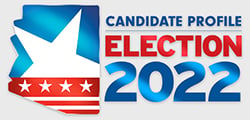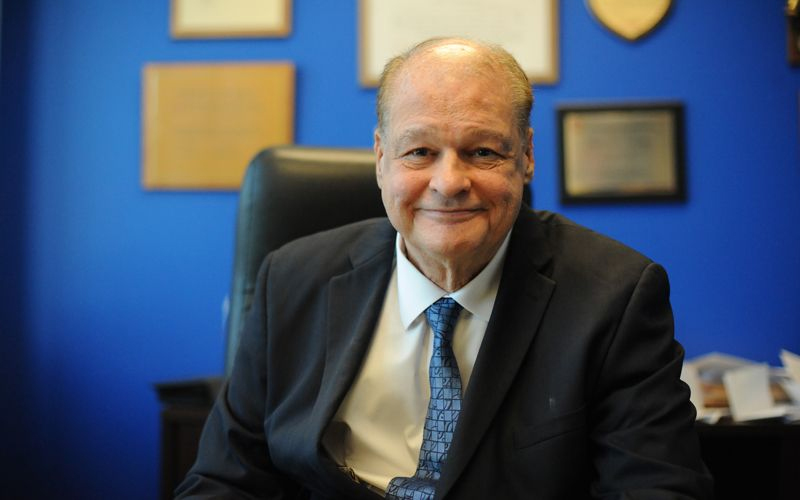
Political affiliation: Republican
Position sought: Superintendent of Public Instruction
Age: 77
Career: Superintendent of public instruction; attorney general; District 24 representative in Arizona House
Website: electtomhorne.com
Experience is abundant in the race for superintendent of public instruction. Republican Tom Horne was superintendent for two terms, from 2003 to 2011, and his opponent, Democrat Kathy Hoffman, took office in 2019.
In all, Horne has 18 years of public service in state government. He was elected to the Legislature in 1996 and served until 2001. In 2010, he was elected state attorney general and served a single term.
As schools superintendent, Horne led the charge to ban ethnic studies in public schools. He also introduced changes in how schools test students for English proficiency that led to a U.S. Justice Department investigation that found the changes were in violation of the 1964 Civil Rights Act. Horne also advocated for and oversaw the expansion of kindergarten from a half-day program to a voluntary full-day program.
Horne’s current campaign ran into a snag this summer when he confirmed that his campaign had hired former state Rep. David Stringer, who was accused of soliciting sex from young boys in 1963. Stringer was forced to resign in 2019 after he was recorded making racist speeches.
Horne distanced himself from Stringer when the information became public, tweeting: “My committee has refunded the in-kind contribution by Mr. Stringer. That in-kind donation was the only association he ever had with our committee. He is not involved with our campaign.”
If elected, Horne said he will focus on fighting against the teaching of critical race theory in schools and replace bilingual education with English-immersion programs. He would require high school students to pass a standardized test to graduate and remove Q Chat, an online chat program for LGBTQ+ youth, from school websites. Finally, he said he would place a police officer in every school to protect students and teachers.
Horne’s campaign has attracted national attention for its focus on conservative values, which have taken center stage in other school races nationally. Politico has called the race “a test of how a swing-state Democrat might hold onto their office as the Republican Party increasingly builds an offensive on reshaping education.”
The outcome of the race likely rests in the hands of independent voters, who make up about one third of the electorate. As of October, Hoffman raised $146,984, and Horne raised $720,667, with $550,000 coming from his own pocket.
Horne talked about his campaign and his priorities in an interview with Cronkite News.
Q: Why are you interested in this job?
Academics have become less of a priority in Arizona schools under Hoffman, he said.
“I focused on academics. She focused on critical race theory,” which Horne means education centered on “the accident of race.” He said he wants to return to teaching the facts he believes critical race theory distorts.
Critical race theory is a college-level academic theory that systemic racism is built into American institutions, from the judicial system to housing to medical practices. It is not being taught in Arizona K-12 schools.
Horne also wants to bring test scores back to pre-Hoffman levels. Proficiency rates were 60% in math and 74% in reading when he left in 2011 – figures he repeats on his campaign website. Those results are close to, but not exactly, what new outlets reported at the time.
His website states that scores fell to 42% in reading and 33% in math in 2019. While those scores are accurate, what Horne doesn’t disclose is that Arizona began using a new test in 2015. Under the Horne administration, the state used the AIMS test. The new test, AzMERIT, shifted the standards from subject-based competencies to preparedness for college education. State education officials also note that test scores dropped as a result of the COVID-19 pandemic, during which schools moved to remote teaching.
Q: What in your past work, political or volunteer experience makes you the best candidate?
“I’m an education policy wonk.”
In addition to his previous two terms as superintendent, Horne was a member of the Paradise Valley Unified School District School Board for 14 years and chaired the board for 10 of them.
He also emphasized his work as chair of the Academic Accountability Committee while in the Legislature. The committee is responsible for the A through F Arizona School Accountability System, which gives schools a letter grade based on their students’ academic performances.
Q: What are the major issues facing Arizona schools?
In addition to test scores, Horne said restoring discipline to the classroom is a major challenge, adding that the chief reason teachers quit is a lack of administrative support when they discipline students.
His website elaborates: Students “can defy teachers, swear at them or ignore them, and there are no consequences.” Hoffman’s “emphasis on ‘social and emotional learning’ has compounded the problem because teachers are discouraged from disciplining misbehaving students because discipline hurts their feelings.”
Q: What will be your top priorities if elected?
Besides test scores and discipline, Horne said he will remove all race-centered education from Arizona schools.
“My philosophy is we’re all individuals. We’re all brothers and sisters under the skin. Race is irrelevant.”
He also would double funding for school resources officers, putting one in every Arizona school.
“Saying you’re a gun-free school says, ‘I’m a victim. Come get me.’”
Hoffman contends that schools need more counselors and social workers instead.
Horne also would shut down Q Chat, a chat room for LGBTQ+ students to talk about issues that concern them. Horne’s website says the site “encourages children to chat with unlicensed adults about hypersexual topics. … If hacked this could be sold on the dark web to sexual predators.”
Q: How will you work to improve bipartisanship in politics?
“I’ve never been hyperpartisan. I’ve always worked well with Democrats.”
He pointed to his support for a bill promoted by then-Gov. Janet Napolitano to finance the expansion of kindergarten from half-day to voluntary full-day programs.
Q: Do you have any concerns about the security of our elections?
“I made the decision when I decided to run that I would comment only on education policy.”
Q: What is a personal challenge you need to overcome?
Horne said there aren’t any.
Q: Please share a quote or advice that you live by.
“If you chase money, money will flee from you. If you chase greatness, money will find you.”
Q: Do you think Arizona schools are underfunded? Why or why not? If more funding was available, how would you prioritize additional spending?
The state’s poor test scores are, in part, a reflection of underfunding, particularly with regard to teacher pay, Horne said, adding that Arizona is losing teachers to surrounding states that have more competitive pay.
“Schools are no better than the teachers in the classroom. We can’t keep losing good teachers and expect to be having good learning and good test scores.”
However, schools need to be accountable for how additional funds are spent, he said. The money needs to go for teacher pay, not administrative salaries.
Q: How would you address the teaching of sometimes controversial topics such as race and gender identity? What place, if any, do such topics have in the classroom?
Horne said topics like slavery, the Jim Crow era and the Tulsa Race Massacre should be taught in schools. However, he opposes teaching critical race theory.
He said he believes character and merit should be the focus of education – not race and gender identity.
“Teach them that their identity is irrelevant.”

